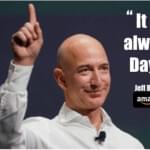30 second summary:
Successful high-growth SMEs and enduring organisations have clear end-goals that people buy into and collectively commit to deliver. This article looks at how clear and compelling goals enable us to succeed - as individuals, teams and organisations - in the context of constant, increasingly complex and accelerating change.
How do we succeed, as individuals, team's and organisations, in the context of constant, increasingly complex and accelerating change?
By having clear end-goals that anchor us, that provide purpose and destination
However great the darkness or tempestuous the water's around us. Indeed, the hallmark of successful high-growth SMEs and of enduring organisations is that they have clear end-goals that people buy into and collectively commit to deliver.
But what happens to those end-goals when the magnitude of change makes them feel unachievable?
We’d like to think that characteristics such as perseverance, resilience and ingenuity go up a gear. Yet the reverse can be true. ‘Rabbit in a headlights comes to mind. As a director in one consulting engineering client confessed: “Instead of galvanising me, constant change ties me up in knots.”
Most often, change forces an adjustment of ‘strategy’ or approach to our goal. We see this in successful sports-people, enduring artists, adventurers, great corporations and effective politicians. In the vanguard are those who constantly reinvent themselves – re-engineer their ‘strategies’ – to maintain pole position. Think Bowie. Think Prince. At the risk of appearing hypocritical, inauthentic and inconsistent, if we don’t change our approach in the face of change, we do our vision and teams great injustice.
To succeed requires not that we change our end-goals, but that we adapt our approach to attack those goals differently. Success belongs to those who are so wedded to their end-goals that they sacrifice ‘strategies’ to achieve what they set out to accomplish
Therefore, change requires a rethink of ‘how’ and ‘what’ we do. Arguably that is much harder than changing the end-goal, or ‘the why’ of the things we do.
Factors that Contribute towards Successful Change
Research suggests that for change to succeed, certain factors need to be present. Most important are a:
- Strong sense of knowing what is happening, provided by clear, regular communication
- Coalition of people willing to shift as one to make change happen
- Sense of retained control for those going through the change, so that they participate in the change, not find themselves at the receiving end of it
- Clear vision of what the change is leading to (the rainbow at the end of the storm)
- Compelling need for the change (the inevitable demise or unsustainability of the status quo)
- Clear process for getting from the ‘as is’ to the ‘to be’.
So, in this period of unprecedented change – declining consumer demand, shifting trading alliances, volatile international politics, mass social migration… how do we within our organisations…?
- Prioritise communication and give consistent key messages
- Encourage alignment with like-minded others to collectively engage in the change
- Give people a greater sense of control so they act quickly and play to their innate skills
- Reframe our vision so that it remains relevant, value-adding, achievable, inspiring, distinctive
- Articulate the business-case for adjustments – as individuals, teams, organisations
- Agree the process for making those adjustments – that hold each other accountable for individual parts
Decision-Making and Vision in Successful Change
A red-thread in all of the above is the need to engage our people in our decision-making processes. Arguably this applies irrespective of magnitude of change - to stay in an alliance like the EU or leave, to continue to invest in a given market or exit, to persevere with one course of action or change tack, to maintain confidence in the team and individuals within it or change players.
Whatever the decision, we owe it to our organisations to hold fast to our vision until we have exhausted all other change options. History suggests that in the storm of change, those who keep focused on their end-goal are most likely to succeed, or at least to survive to surf another day.
We all know that, as organizations, we need to surf constant change - whether we are the creators of the waves others have to surf or are caught in the swell created by others. To explore how you could do so more creatively and effectively, call Rathbone Results on 020 8798 0175 or email me at cora-lynn@rathboneresults.com
A trusted business adviser, Cora Lynn has gained extensive international experience through senior roles in leading business schools and global consultancies and has published 3 books. She works with businesses to unlock potential. Example: one consulting engineering client grew net profit by 180%.

Book an exploratory call to find out how we can help you unlock your business potential.
Don't miss our latest insights
Subscribe to our Resource centre
Other articles that may interest you:

How to Develop a Winning Mindset in Business
Developing the right mind-set is critical for becoming a successful business entrepreneur, and one of the key mind-set issues for a successful bus...
Read more
How To Identify Opportunities In Times of Uncertainty or Crisis
Out of the mouth of babes … How would you answer the following four questions posed during a socially distanced VE day encounter? From L, aged 8: “...
Read more